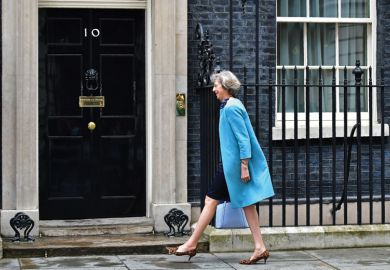A major review of UK policy on overseas students has rejected calls for them to be removed from the net migration statistics and for the reintroduction of post-study work visas – but does question the government’s overall net migration target.
The Migration Advisory Committee says in its report to the government published on 11 September: “We know that the sector will be disappointed by our recommendations on post-study work but demand for UK education should not be based on work rights.”
The committee, led by Alan Manning, does recommend that leave to remain in the UK be extended to six months for all master’s students and to 12 months for all PhD students, along with easing the rules for those switching from student to skilled worker visas once they have left the UK for up to two years after graduation – putting them on the same footing as those who make the switch within the UK.
But that falls well short of the two-year post-study work visa for all overseas students advocated by Universities UK. The government abolished post-study work visas in 2012, a move often seen as a key factor in the dramatic fall in the number of Indian students coming to the UK.
Professor Manning, professor of economics at the London School of Economics, says in his foreword: “We do not recommend a separate post-study work visa though our proposals on automatic leave to remain at the end of study have some of the same effect.
“One reason for not recommending a longer post-study work period is that the earnings of some graduates who remain in the UK seem surprisingly low and it is likely that those who would benefit from a longer period to find a graduate level job are not the most highly skilled.”
The report also says in its recommendations: “International students should not be removed from the net migration statistics.”
The inclusion of students in the government’s target to reduce net migration to the “tens of thousands” is widely seen as creating an incentive for the government to tighten the student visa regime and decrease numbers.
In his foreword, Professor Manning says: “Many of the responses to the call for evidence argued that students should be taken out of the government’s net migration target. None suggested a practical way in which this might be done and we cannot see a reliable method.
“Even if a method was found, it would be unlikely to make much difference to the net migration statistics because most students leave the country and the ones who do not have to be counted.”
Professor Manning adds: “If there is a problem with students in the net migration target, it is with the target itself rather than the inclusion of students in that target. Summarising migration policy through the net migration target may give the impression that government seeks to reduce the net migration of all types of migrants including students.”
In its conclusion, the report offers a number of options on net migration figures, including that “the government could…choose not to have a target at all and summarise its ambitions on net migration in a different way”.
But in a passage that may irritate university leaders, the report says: “We do think there may be an image problem for the UK in some areas and the sector and government should continue to work together to improve the image. Part of that joint action would be to talk less about students in the net migration target as it is possible that the repeated discussions of students in the target is itself contributing to the problem.”
Whether Theresa May – who as prime minister and home secretary has wedded herself to the target – is willing to change course in response to the MAC report remains to be seen.
Professor Manning offers warm words on the “positive economic benefit” of international students, and warns that in relation to the UK’s position as number two recruiter of overseas students, “there is a real risk we will be overtaken by Australia in the near future”.
The committee does also recommend that “government and the sector should continue to work together to grow the number of international students”.
And it recommends that there should continue to be “no cap on the numbers of international students”.
Register to continue
Why register?
- Registration is free and only takes a moment
- Once registered, you can read 3 articles a month
- Sign up for our newsletter
Subscribe
Or subscribe for unlimited access to:
- Unlimited access to news, views, insights & reviews
- Digital editions
- Digital access to THE’s university and college rankings analysis
Already registered or a current subscriber?








